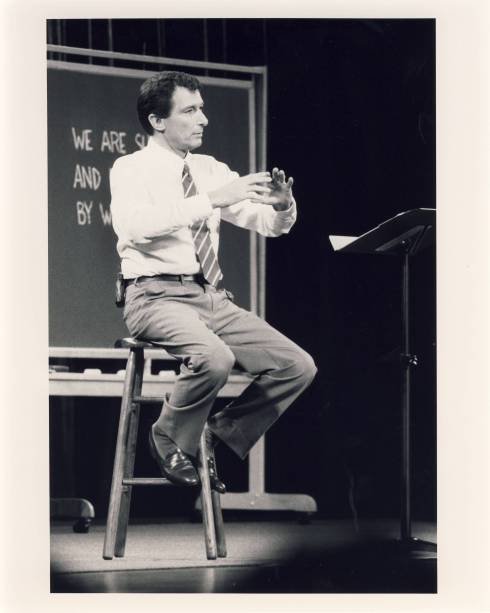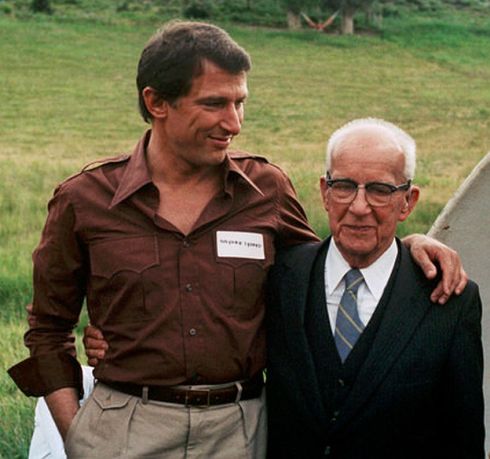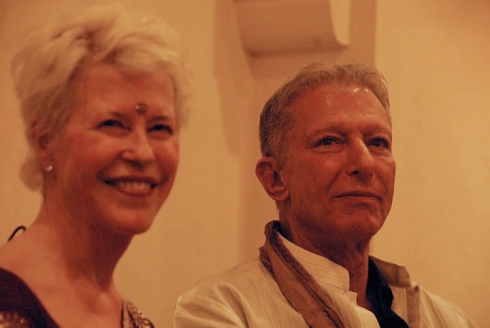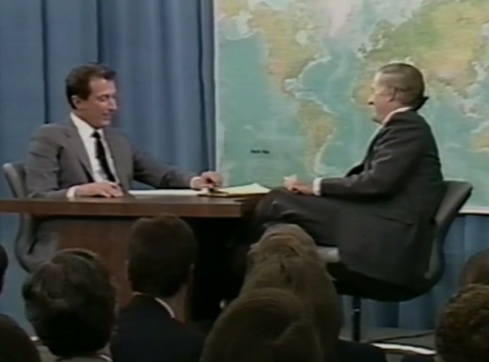You are currently browsing the tag archive for the ‘est training’ tag.
- Decide on a project for which you are willing to take complete responsibility.
- Complete the project successfully.
- Relate this achievement to others as an inspiration for them.
- Your willingness to express yourself may be just the trigger needed by someone else to do something for themselves.
- From now on, don’t wait for something to happen to you. Actually take responsibility for making something happen. Keep at it until you make it a successful experience for everyone.
- You can make the difference.
~Werner Erhard
“Your power is a function of velocity, that is to say, your power is a function of the rate at which you translate intention into reality.”
“My experience of est was that it helped the participants to get more in touch with feelings and emotions and helped them let go of those that were negatively affecting their lives. It led participants to realize experientially our true freedom and responsibility. Strengthening and vitalizing the humanity of the participant, EST opened the space for a greater penetration of grace and more vigorous faith life”
~ Father Basil Pennington O.C.S.O., Monk of Cistercian Order, Roman Catholic Church, world renowned spiritual teacher and author of several books
My notion about service is that service is actually that kind of relationship in which you have a commitment to the person. Service is about knowing who the other person is, and being able to tolerate giving space to their garbage. What most people do is to give space to people’s quality and deal with their garbage.
Actually, you should do it the other way around. Deal with who they are and give space to their garbage.
Keep interacting with them as if they were perfect. And every time you get garbage from them, give space to the garbage and go back and interact with them as if they were prefect. ~ Werner Erhard
“The moment when you really experience that you have created yourself being whatever way you are, at that same moment you will never have to be that way again.”
-Werner Erhard

WERNER ERHARD: “I’ve had the opportunity and the privilege to count some great men and women among my friends. They all have the same problem: they cannot get their students to be masters as they are—even students with all the intellectual equipment you can imagine. I tell them that the reason they can’t turn their students into masters is that they are fibbing to themselves about the source of their own mastery. They attribute their own mastery to everything other than its actual source: creation. Creating and Being exist in the same domain. And there is a discipline to Being, to creation. The domain of Being has its own rigor; Being is approachable, it is masterable; it’s not nebulous.
“Imagine someone who wants to be a great manager. In the normal course of events, such a man or woman would start off by, let’s say, studying management—perhaps in school, in books, or as an apprentice. Eventually, he or she would collect all the things that great managers have—degrees, credentials, diplomas, great track records, and great biographies. Then, at that point, we say, “Well, Mr. or Ms. X is a great manager!” Later, we send our children to the same schools so that they can become great managers too.
“Except, most of the children who go to those schools never do become great managers. And we explain that failure on the basis of genes, environment, intelligence, opportunity, and the like. It never occurs to us that our template for becoming a great manager, or, more accurately, for becoming a great anything, is backwards. Never do we consider that what makes a great manager is NOT the school, books, or education, but simply BEING a great manager.
“Now, I know that statement looks absurd at first, but it’s a very interesting possibility. If you discipline yourself to look for what’s present, for what is occurring in the moment, then you can ask yourself, “When someone is being a great manager, what is present?” What’s present (and all that is present, really) is being a great manager. What produces greatness, at the moment when greatness shows up, is being great, period. All the credentials follow from that, not the reverse.
“Most people to whom I talk think, “Hey, great! That means I don’t have to go to college!” That’s not what it means. All the learning, apprenticing, practicing, and thinking are still necessary. My point is not that those practices aren’t necessary; my point is that when greatness does show up, none of those practices is the source of it. They do provide the conditions for it, but none are the source of the greatness itself. The source is, very simply, Being great. The question we are concerned with in our work is, how does one master this domain of Being?
“So, I apologize for a very long answer to a very short question, but it hit right at the heart of our work—that of exploring, investigating, and making available what it means to be anything.”
An Interview with Werner Erhard, by Norman Bodek; ReVision: The Journal of Consciousness and Change, Vol 7, No. 2, Winter 1984 / Spring 1985

Every era has a relatively small number of original and influential persons, those who generate initiative, discoveries, achievements and insights which shape our own cultures and societies — and often those of future generations. If we know these people well, it is through their works: their campaigns and institutions, their books and inventions, their vaccines, their symphonies, their monuments and their firms.
The Saturday Satellite Series with Werner Erhard was a program designed to give us a new access to such people — a glimpse of the commitments and visions that inform such lives, and that serve as the source of their creations. The series was conducted as a dialogue between Werner Erhard and prominent guest speakers who are widely recognized for their achievements and expertise. These dialogues were designed not to present particular views, but to open an inquiry that elicits creative thinking and productive action from and for all participants.
Since we have been raised and educated in a you or me world, and since very few of us have noticed the shift to you and me, we are going to have to work out the rules for living on our own. We won’t get much help. Werner did share his own perceptions of some of the other new rules, or operating principles, for the you and me context.
1. Respect the other person’s point of view, whether or not you agree with it. Recognize that if you had their history, their circumstances, and the forces that play on them, you would likely have their point of view.
2. Consider life a privilege – all of it, even the parts that are difficult or seem a waste of time.
3. Give up the islands that reinforce mediocrity, the safe places where we gossip and complain to one another, where we are petty.
4. Take a chance. Be willing to put your reputation on the line; have something at stake.
5. Work for satisfaction rather than for credit.
6. Keep your word. There will be times when the circumstances of life will make you forget who you are and what you’re about. That is when you need to be committed to keeping your word, making what you say count.
From the Friends of Werner Erhard Website
“Most of our notions about the world come from a set of assumptions which we take for granted, and which, for the most part, we don’t examine or question. We bring these assumptions to the table with us as a given. They are so much a part of who we are that it is difficult for us to separate ourselves from them enough to be able to talk about them. We do not think these assumptions, we think from them.”
-Werner Erhard
“Breakthroughs are a product of seeing something in a new way, which enables you to see new opportunities and new openings for action that you couldn’t see before. Breakthroughs come as a result of shifting your commitment from the predictable future to a possible future.”
- Werner Erhard
“Sometime around now – it may have happened five years ago or fifty years ago – but sometime around now, the rules for living successfully on this planet shifted. We can no longer hope to live meaningful, purposeful lives using the rules of a you or me world. It’s becoming clearer and clearer to those who will look that in order to live successfully on this planet, we must discover and live by the rules of you and me.” – Werner Erhard
“Consider that all accomplishment is constituted by a series of resolved breakdowns.”
-Werner Erhard
The support of the Werner Erhard Foundation made possible groundbreaking conversations between leaders, scholars and officials from virtually all parts of the world in the fields of human achievement and transformation. As a result of this support exchange programs were launched that provided new ground for international cooperation.
One such program was the US/USSR Project, launched by Werner Erhard and the Werner Erhard Foundation in 1979 and designed as an educational exchange to explore the principles of communication, management, and creative thinking with the people of what was then the Soviet Union.
“I have no interest in the justification of circumstances or producing guilt in others by assigning obligation. I am interested in providing an opportunity for people to experience mastery in the matter of their own lives and the experience of satisfaction, fulfillment, and aliveness. These are a function of the self as context rather than thing, the self as space rather than location or position, the self as cause rather than self at effect.”

“An Evening with Werner Erhard: On Mastery”
Werner Erhard delivered public lectures for over two thousand people in New Delhi and in Mumbai in November 2010. Werner Erhard is pictured here with Gonneke Spits in Panchgani, India. For more on the events in India visit wernererhard.com
“If you’re not all right the way you are
it takes a lot of effort to get better.
Realize you’re all right the way you are,
and you’ll get better naturally.
………………Don’t change beliefs.
………………Transform the believer.”
–Werner Erhard (from the Little Book of Aphorisms)
CREATING ECSTASY
In the presence of relationships that simply swept him away, Werner remarked, “I remember myself saying things like, ‘Marvelous, fantastic… but, an accident.’ We think that such things happen only by chance. They are not accidents. We have the power to create the space of relationship, to achieve mastery of our relationships. I’m not talking about being in ecstasy, or working little by little toward ecstasy. I’m talking about being willing to come from ecstasy, even when you are being serious, or having a problem, or not even thinking about ecstasy.”
-Werner Erhard – from The Graduate Review, September 1978
_____






